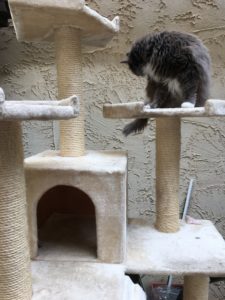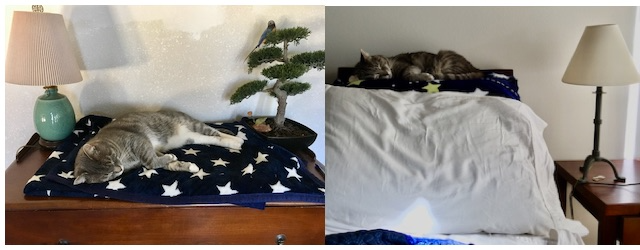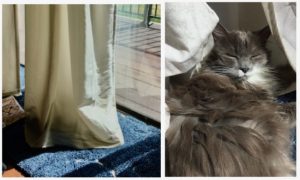The Cat Friendly Home: A safe place for your cat
Cats are not small dogs nor are they humans in little fur suits. What kind of environment do they need to stay healthy and happy?
ENVIRONMENTAL GUIDELINES – WHAT DO CATS NEED?
- a safe place
- access to multiple, separate resources
- opportunities for predatory play
- positive and predictable interactions with humans
- a habitat that respects the cat’s sense of smell
The cat friendly home: a safe place
The domestic cat’s close relative, the African wildcat, takes shelter in hollow trees, rock crevices or dense thickets when not out hunting for food (African Wildcat Field Guide). The female wildcat often chooses burrows abandoned by other animals such as the Fennec fox to raise her kittens and she moves them frequently to other dens.
What’s so great about a burrow or den?
- easy to defend against predators
- usually out of the way
- protects the inhabitants from the extremes of temperature and exposure to weather.
Our indoor cats will choose a safe place in the same way as their wild relatives – a place that is secure, secluded, a hiding place to retreat to, warm in the winter, cool in the summer.

Many cats prefer high places.
- it is easy to see if another cat, pet or human is coming
- it is harder for humans especially children to reach up and disturb kitty
- Cons: kitty does have to come down to eat, drink, etc
A cat can have more than one “safe place”
- one may be high
- another may be low
- shared with a cat of the same socialgroup
- time-shared with a cat not a member of the group
- chosen for temperature
- day- or night-time use

Safe place for a winter afternoon: a curtain in a sunny window hides a surprise – a cat napping inside!
safe places can change
Gus chose the dresser in the bedroom as a place to spend the night shortly after he moved in. We placed a fleece blanket on top of the dresser to keep him comfy. After 6 months or so, he decided to sleep on the desk chair in in the office at night. His latest choice is a pillow at the head of the bed – a small fleece square is on top of the pillow to manage the fur!
the cat friendly home: A safe place for your cat – tips for cat guardians
A safe place can take many forms from a commercial cat tree to a cardboard box in a closet. There is even a gadget called a “Door Buddy” to the closet door ajar enough for only the cat to pass through. Watch your cat and see where she chooses to have a safe place.
Your cat’s carrier can be a safe place.
- Leave the carrier out in an out of the way place.
- Put some of your cat’s favorite treats or a meal close to or inside the carrier.
- A cover out of light weight fleece is easy to make (hemming is not needed). It will make the carrier dark and inviting and can be coordinated with your decor!



Karen Gifford says:
I am going to pass this information on to a friend who is moving with her 13 year old cat. Currently her girl, Goldie, is experiencing some medical issues like confusion and missing the litter box. She will be leaving her current location soon and wants to do the best she can for the adjustment process. Thank you.